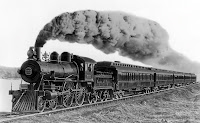 |
| Irven |
 |
| Ruby |
I know
little about my Uncle Irven Rider, the husband of my Mom’s sister Ruby. I
remember him as a peaceful, quiet presence in their home. My most vivid memory
is of him sitting down at the piano in their Parma, Idaho, home and playing
“Star of the East” for me. As he played, he became emotional and told me that
it was his very favorite song. That alone tells me that Uncle Irven was a man
of great faith who loved the Savior.
In case
you are not familiar with this beautiful Christmas carol, the lyrics include
these phrases:
Star
of the East, oh Bethlehem star,
Guiding us on to heaven afar,
Smile of a Savior are mirrored in Thee,
Glimpses of Heaven in thy light we see.
Guiding us on to heaven afar,
Smile of a Savior are mirrored in Thee,
Glimpses of Heaven in thy light we see.
Uncle Irven played the song by ear, so after I returned home I found the music so that I could love it too, but I couldn't play it with his emotion and expression.
An oft-quoted scripture in Matthew, chapter
seven, states, “Wherefore, by their fruits ye shall know them.” The next verse
goes on to ask, “Do men gather grapes of thorns, or figs of thistles?” That verse
leads me to believe that there is also truth in turning the verse, “Wherefore,
by their roots shall ye know them.” That sentiment gives me hope as I discover
the nobility of my ancestral roots. It also tells me something about my Uncle
Irven as I learn of his roots.
Irven’s
father, John McDonald Rider, was the oldest in a family of thirteen children,
eight boys and five girls. When John was only two years old his father was
called by President Brigham Young to help settle Southern Utah in Kanab. As you
can imagine, being the oldest son, he was well acquainted with hard work. As a
young boy he enjoyed herding cows and would dream of owning his own herd.
Eager
to earn his own living, at the age of sixteen years, John gained permission
from his parents to work for another rancher herding sheep on the north rim of
the Grand Canyon for a salary of twenty dollars a month and his food. After
working four years, he had saved enough money to buy one hundred and fifty head
of cattle, fulfilling his childhood dream.
He
had a strong musical ear, which he would pass on to his son, Irven. In the
evenings, after a long day on the range, he and his hired men would gather
around a small grass and brush fire, and John would play the guitar and sing
in his clear tenor voice. He was also talented on the organ, harmonica, and
accordion (an instrument upon which Irven later became proficient). In
accordance with his name, he was an excellent rider and a strong contestant in
rodeos.
Life
was going very well for John. He was successful in his ranching business and
felt well rewarded for his hard work.
 |
| Chicago World's Fair 1893 |
In
1893, the World’s Columbian Exposition (also known as the Chicago World’s Fair)
was held to commemorate the 400th anniversary of Christopher
Columbus’ voyage to the New World.
 |
| President Heber J. Grant |
The leaders of the Mormon Church saw this as
an opportunity to garner international respect for Utah in its quest for
statehood. For reasons I have been unable to track down, President Heber J.
Grant asked John, then twenty-five, to round up three hundred head of wild
horses, load them on a train and take them to Chicago to the Fair. I imagine they were used in wild west shows and rodeos.
This
was a very enjoyable and interesting trip, but when John returned home he
learned that his cattle were dying. They were choking to death. Drought had
caused the grass to wither and the watering holes to disappear, leaving white
alkaline fields of sunbaked earth. John saw the remaining cattle standing
motionless, flies buzzing over their bony backs, heads down, their tongues
hanging from their partially opened mouths. Many were too weak to stand. It was
a sickening sight, but nothing could be done to save the starved animals. Sick
at heart, John turned his horse and rode wearily away. For the next two years
John worked tirelessly until he was finally able to buy fifty head of cattle
and a few horses. He rarely spoke of his loss and saw it as only a small setback.
In
the meantime, he met a cute young amateur actress from Orderville who was
performing in a play in Kanab. John played the organ in the orchestra for the
dance after the show. Consequently lively Rhoda Jensen met John Rider. On a
horseback riding date, John let Rhoda ride his best horse “Babel”. When he
asked her how she liked the horse, she replied, “It’s wonderful. I would like
to have a horse like this for my own.” John told her that the girl who became his
wife could have her. Rhoda replied, ''All right, she belongs to me." And
so they were engaged. They
were married April 24, 1894, in the beautiful St. George Temple.
My
Uncle Irven was the eighth child born to this couple. By the time of his birth
the family had moved from Kanab, to Basalt, and then to Woodville, Idaho. His father, John, served as the bishop of the Woodville ward for many years. The family later
moved to Blackfoot where Irven was raised and educated.
I
know more about Uncle Irven now, from learning about his roots, having grown on
a family tree with roots of obedience to the call of the Prophet, hard work, sacrifice, and family values.








